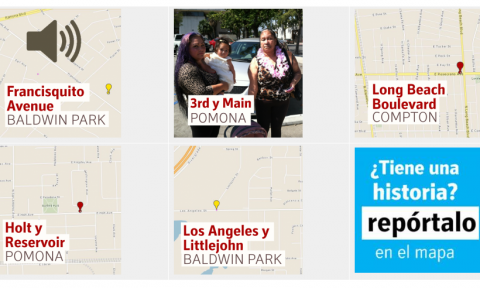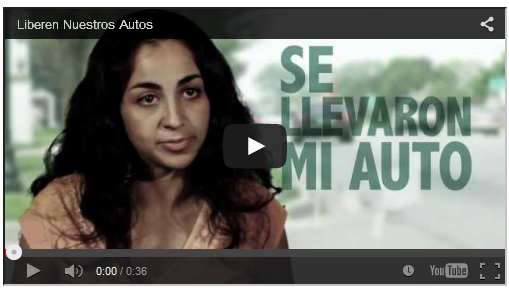Liberen Nuestros Autos - lucha en contra de los decomisos injustos
Free Our Cars!
See stories from community on a map
Throughout Los Angeles, unfair impoundment policies were disproportionally affecting immigrant communities and families. When a family lost their car, the results could be devastating. Healthy City working with a diverse coalition of organizations identified what communities were most impacted by vehicular impoundments and initiated a campaign to change these restrictive policies - Liberen Nuestros Autos / Free Our Cars.
Advancement Project – California, The California Community Foundation, American Civil Liberties Union, Instituto de Educación Popular del Sur de California (IDEPSCA), Presente.org, Pomona Economic Opportunity Center and LA VOICE coalesced our expertise in policy, community organizing, mobile technology and virtual communications to organized a three-pronged approach that included Know Your Rights training for drivers, mobile mapping and community organizing.
The Problem Uncovered: Research conducted by California Watch in 2010 found that there was a practice among law enforcement around “selective enforcement” and posting “random DUI checkpoints” in or near Latino neighborhoods. Citing immigrant communities for “driving without a license” stripped them of a reliable form of transportation, placing their health and economic wellbeing at risk.
The outcome: Police were seizing cars in predominantly Hispanic cities at three times the rate of cities with small minority populations. Additionally, more cars were impounded at DUI checkpoints because of unlicensed drivers than for actual DUIs. And, although each impoundment would set a family back $1000 to $4000, cities were using the money collected to fill budget holes with an estimated $40 million generated from towing fees and fines. Officers were also receiving an estimated $30 million in overtime pay funded by the Office of Traffic Safety to conduct checkpoints.
Through a grant from CCF and the Knight Foundation Healthy City developed a bilingual tool for drivers to report car impoundments and map incidents onto a Wikimap. Users could map the location of their impoundment, label it as a “checkpoint” or “traffic stop”, and upload a photo or video. The coalition also created a voicemail system, where users could leave voicemails detailing the incident and HC would upload the details for them.
The Coalition’s mobilization and media campaign gathered over 1000 stories and documented where the highest incidents of impoundments were occurring. Moreover, we documented the stories of how these policies where affecting people’s lives. The coalition ran a multi-month informational campaign with traditional radio and TV and Public Service Announcements. Through grassroots mobilization we engaged communities with social media, SMS and other information dissemination efforts.
See stories from community on a map here.


